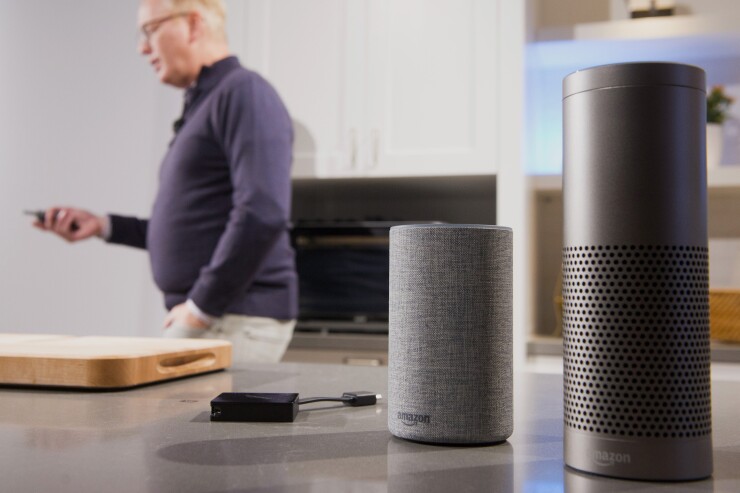Amazon’s Alexa voice-activated virtual assistant technology is now HIPAA-eligible, enabling healthcare organizations to build applications with the technology.
Amazon announced that the Alexa Skills Kit can be used by some covered entities and their business associates, subject to provisions of the Health Insurance Portability and Accountability Act of 1996 to build Alexa “skills” that transmit and receive protected health information.
The determination means that the new version of the Amazon technology can be used for applications that are subject to the data privacy and security requirements of HIPAA.
Within 24 hours, six healthcare payers, pharmacy benefit managers, digital health coaching companies and providers released consumer-focused uses for Alexa.
“Developers are inventing with voice to build helpful and convenient experiences for their customers,” says Rachel Jiang, head of Alexa Health and Wellness for Amazon in a blog published last week. “These new skills are designed to help customers manage a variety of healthcare needs at home simply using voice, whether it’s booking a medical appointment, accessing hospital post-discharge instructions, checking on the status of a prescription delivery and more.”

Using the increasingly familiar Alexa voice-activated virtual assistant to interact with healthcare organizations offers a new avenue to engage patients.
“While devices like PCs, tablets and smartphones have contributed to advances in healthcare, they’ve been problematic for some aspects of patient engagement—particularly among the elderly and others who physically cannot, or will not, use them,” says Nathan Treloar, president and co-founder of Orbita, a company that develops conversational AI for enterprise-grade voice- and chatbot-powered virtual assistants.
Until now, Alexa’s use in healthcare has been mostly limited to question answering services—voice apps, or “skills”—that answer general questions about health conditions, treatments and symptoms, Treloar says. With this upgrade, Alexa can now be used in certain applications that collect and transmit protected healthcare information. This enables a range of voice applications, such as remote patient monitoring, population health, medication adherence and clinical trial optimization.
Organizations launching new healthcare skills with the Alexa Skills Kit include:
- Express Scripts, a pharmacy benefits management company, developed an application that enables members to check the status of a home delivery prescription, and they can request Alexa notifications when prescription orders are shipped.
- Cigna offers Cigna Health Today, which enables eligible employees of companies with which it has contracts to manage health improvement goals and increase opportunities to earn incentives.
- Boston Children’s Hospital will use Alexa in tandem with its My Children's Enhanced Recovery After Surgery (ERAS), letting parents and caregivers of children in the ERAS program to provide their care teams with updates on recovery progress and receive information regarding their post-op appointments.
- Livongo, a digital health company, enables members to query their last blood sugar reading, blood sugar measurement trends, and receive insights and “health nudges” that are personalized to them.
- Swedish Health Connect (by Providence St. Joseph Health) and Atrium Health enables customers to find an urgent care location near them and schedule a same-day appointment.
Representatives of the organizations—invited to participate by Amazon—say they believe the technology can improve the healthcare experience for both consumers and clinicians.
“With our new Express Scripts skill, we are trying to make it easier for people to make better-informed healthcare decisions,” says Mark Bini, vice president of innovation and member experience for the company. “Voice technology like Alexa can make it easy for people stay on the right path by tracking the status of their mail order prescription, helping us further solve the costly and unhealthy problem of medication non-adherence.”
There will be continued development of applications that use voice-assistive technology, but many issues still remain, Treloar says. “Many healthcare IT departments use other industry standards or have created their own standards for data privacy and security,” he says. “In their eyes, completely securing a voice application may go well beyond ensuring that a service provider will sign a HIPAA business associate agreement. Issues like user authentication, data privacy in shared spaces, network and device hacking, and secure system integration should all be addressed.”





